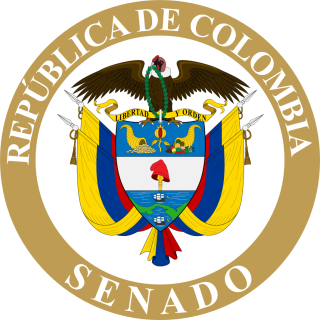The politics of Colombia take place in a framework of a presidential representative democratic republic, whereby the President of Colombia is both head of state and head of government, and of a multi-party system. Executive power is carried out by the government. Legislative power is vested in both the government and the two chambers of congress, the Senate and the House of Representatives of Colombia. The Judiciary is independent of the executive and the legislature.

The president pro tempore of the United States Senate is the second-highest-ranking official of the United States Senate, after the vice president. According to Article One, Section Three of the United States Constitution, the vice president of the United States is the president of the Senate, and the Senate must choose a president pro tempore to act in the vice president's absence.
A presidency is an administration or the executive, the collective administrative and governmental entity that exists around an office of president of a state or nation. Although often the executive branch of government, and often personified by a single elected person who holds the office of "president", in practice, the presidency includes a much larger collective of people, such as chiefs of staff, advisers and other bureaucrats. Although often led by a single person, presidencies can also be of a collective nature, such as the presidency of the European Union is held on a rotating basis by the various national governments of the member states. Alternatively, the term presidency can also be applied to the governing authority of some churches, and may even refer to the holder of a non-governmental office of president in a corporation, business, charity, university, etc. or the institutional arrangement around them. For example, "the presidency of the Red Cross refused to support his idea." Rules and support to discourage vicarious liability leading to unnecessary pressure and the early termination of term have not been clarified. These may not be as yet supported by state let initiatives. Contributory liability and fraud may be the two most common ways to become removed from term of office and/or to prevent re-election.
President of the Senate is a title often given to the presiding officer of a senate. It corresponds to the speaker in some other assemblies.

The speaker of a deliberative assembly, especially a legislative body, is its presiding officer, or the chair. The title was first used in 1377 in England.

The Senate of the Republic of Colombia is the upper house of the Congress of Colombia, with the lower house being the Chamber of Representatives. The Senate has 108 members elected for concurrent (non-rotating) four-year terms.

The Chamber of Representatives is the lower house of the Congress of Colombia. It has 172 members elected to four-year terms.

The Congress of the Dominican Republic is the bicameral legislature of the government of the Dominican Republic, consisting of two houses, the Senate and the Chamber of Deputies. Both senators and deputies are chosen through direct election. There are no term limits for either chamber.

The Plurinational Legislative Assembly is the national legislature of Bolivia, placed in La Paz, the country's seat of government.

Radical Change is a conservative liberal political party in Colombia.

Horacio Serpa Uribe was a Colombian lawyer, politician and Senator. Serpa ran as the Colombian Liberal Party candidate for President on three occasions; in 1998, 2002, and 2006. He previously served as congressman for Santander as Senator, Inspector General of Colombia, president of the National Constituent Assembly, Minister of the Interior, and as Ambassador to the Organization of American States. He was also involved in the 8000 process scandal in which money from the Cali Cartel entered the presidential campaign of Liberal candidate Ernesto Samper. In 2007 Serpa ran for the governorship of Santander Department and was elected on 28 October in the regional elections.
The constitutional history of Colombia is the process of formation and evolution of the different constitutions that Colombia has had since its formation.

Nancy Patricia Gutiérrez Castañeda is a Colombian lawyer and politician. She served as Senator of Colombia and Member of the Chamber of Representatives of Colombia, having served in both chambers as president.

The President of the Senate of Colombia is the leader of the Senate and the Congress of the Republic of Colombia. The Presidency of Congress is assumed by the person elected as President of the Senate of Colombia by members of the Senate in an election held every year on July 20. The President of the Senate serves a term of one year without a chance for reelection in which they also assumes the presidency of Congress. The current President of Congress is Roy Barreras since July 20, 2022.
General elections were held in Colombia on 21 April 1974 to elect the President, Senate and Chamber of Representatives. They were the first elections after the end of the National Front agreement, which had restricted electoral participation to the Conservative Party and the Liberal Party, with each party allocated 50% of the seats in both houses, whilst the Presidency alternated between the two parties.

The 1800 United States elections elected the members of the 7th United States Congress. The election took place during the First Party System, and is generally considered the first realigning election in American history. It was the first peaceful transfer of power between parties in American history. The Democratic-Republican Party won control of the Presidency and both houses of Congress for the first time. Conversely, the Federalist Party would never again control the Presidency or either house of Congress. Ohio was admitted as a state during the 7th Congress.













